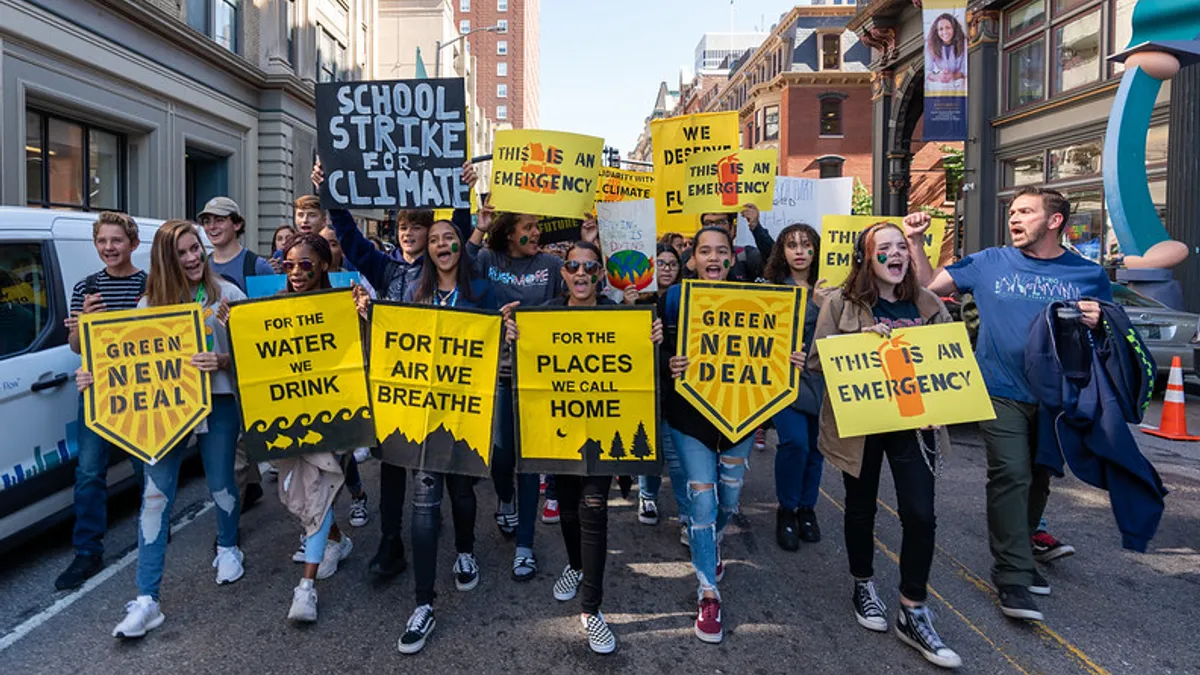Dive Brief:
- The U.S. can cut emissions by 49% below 2005 levels by 2030 with "aggressive federal re-engagement" in 2021, according to a new two-part analysis from America's Pledge. Such reductions would put the country on track to achieve net zero emissions by 2050, despite the new coronavirus (COVID-19) and the current economic crisis.
- The America's Pledge initiative, co-founded by former New York City Mayor Michael Bloomberg and former California Gov. Edmund G. Brown, Jr., released two reports on Monday to address U.S. climate action: the first on how the pandemic might have affected climate efforts, and the second on the progress of U.S. climate goals over the past three years.
- The U.S. has maintained its climate progress with help from "bottom-up climate leadership," or action driven at the local instead of federal level, according to the analysis. Without federal assistance, the analysis suggests U.S. governments and businesses could still reduce emissions up to 37% by 2030.
Dive Insight:
On top of deadly West Coast wildfires and a devastating health crisis, U.S. cities, states and businesses are also battling against climate change.
"When COVID came in and devastatingly attacked both people's lives and the world economy, it looked like something that the devil could have designed to disrupt clean energy progress," America's Pledge Vice-Chair Carl Pope said on a Friday webinar.
The pandemic initially resulted in some short-term silver linings for the climate, including cleaner air, congestion-free streets and an uptick in cycling. But the short-term benefits aren't necessarily indicative of the country's long-term climate health.
"The pandemic dramatically lowered short-term emissions," Pope said. "Those short-term reductions aren't good signs, they're the signs of an economic depression and they aren't sustainable."
Despite the economic downturn, the group concluded to "great surprise" that the pandemic is not slowing climate progress. "If anything, we had greater confidence in meeting de-carbonization goals than compared to a year ago," Pope said.
And despite federal opposition, the U.S. has "passed a tipping point" in its clean energy transition, according to America's Pledge. One in three U.S. residents now live in a jurisdiction that has committed to 100% clean electricity, compared to only Hawaii and 33 cities that had made those same commitments just three years ago, the analysis reports. The electric vehicle (EV) industry has doubled in that same time period.
The group also identified the following five key sectors with the greatest opportunities for emission reductions:
-
Electricity: "The U.S. is moving towards 100% clean electricity," the report reads. Clean energy and electricity generation is moving away from coal, and though the pandemic has impeded some initiatives and legislation, progress will likely continue over the next decade led by local governments and businesses.
-
Transportation: Medium- and heavy-duty EV progress combined with the opportunity for long-term reductions in miles driven will likely override the current downturn in public transit ridership. However, significant investments will need to be made to protect the public transit industry as it recovers from the pandemic, the group writes.
-
Methane: The oil and gas industry, which is responsible for the greatest amount of methane emissions, has weakened due in part to the demand for vehicle electrification. Demand and investments have also reduced drastically due to short-term "price shocks," the analysis writes.
-
Buildings: COVID-19 has put a pause on some policy and financial investments for more efficient buildings, but those obstacles shouldn't have much effect in the long-term as work to electrify new, existing buildings should continue to expand.
-
HFC: States and businesses are leading the charge in reducing "super polluting hydroflourocarbons" (HFC), or GHG that can be thousands of times more damaging to the climate than carbon. Sixteen states have passed or are considering HFC policies and the industry is encouraging federal legislation to curb the "high global warming potential of HFCs."
“The devastating tragedy of Covid-19 appeared designed to derail decarbonization," Pope said in a statement. "Yet, when America's Pledge measured its likely long-term impact, American society is staying the course, moving off of fossil fuels irrevocably and on to a clean energy future. If the pandemic couldn't even slow clean energy, it's hard to see what could."













